2019.02.20
International Exchange Takes Students to Hakone and Kamakura—“Why do Japanese people put their hands together in prayer at shrines?”
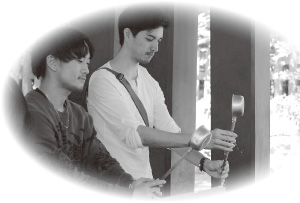
- Science and Engineering Club Shiroikaze
- International students submit articles on their activities
The Chuo University Science and Engineering International Exchange Club (nicknamed Shiroikaze (White Wind)) is a university club that is attracting great attention. Shiroikaze was founded in 2016 with the aim of promoting communication with international students in the Faculty of Science and Engineering. Currently, more than 100 international students from 12 countries and regions interact with Japanese science and engineering students to learn about Japanese culture, while also conveying the culture of their native countries. Shiroikaze fosters understanding for different cultures and gives Japanese students an opportunity to coexist with foreigners. This piece consists of three articles on international exchange; one was written by a Japanese student and two by international students.
How do we use these ladles when praying at a shrine?
International students are teachers—Learning about different cultures in a mini-lesson format
Satoshi Ishizawa (first-year student in the Department of Applied Chemistry)
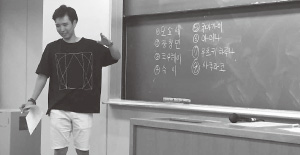
Lesson on the Korean Language
International students and Japanese science and engineering students took trips to Hakone and Kamakura in Kanagawa Prefecture. The day trip to Hakone was held in May and the overnight trip to Kamakura in July.
“Do all Japanese people worship the Shinto religion?”—I was asked this question by an international student. When I replied that Japanese people are not particularly devoted to the Shinto religion, I received a follow-up question: “Then why do Japanese people put their hands together in prayer at shrines?”
International students also asked many other interesting questions—“What are wabi and sabi?” “Why are all Japanese people so well-mannered when it comes to following rules?”
Although some Japanese students were thrown off balance by such questions which are difficult to answer quickly, this kind of experience is an excellent opportunity for us Japanese to reconfirm our understanding of Japanese culture. It is also an outstanding opportunity for international students to learn about Japanese culture.
Personally, I’m really bad at English. Some of the international students also have a difficult time speaking in Japanese. When communicating with such students, I would use simple English words and gestures. Occasionally, I also received assistance from Shiroikaze members who speak multiple languages, so I was able to enjoy my exchanges with international students. Initially, I was worried if I would be able to make friends, but now I really enjoy spending time with students from around the world.
One day, international students volunteered as teachers and gave Japanese students mini-lessons on topics such as their native language, history, and food culture. These lessons are also very popular among students from outside Shiroikaze who speak or study foreign languages.
In recent years, the Internet has enabled us to easily obtain almost any kind of information. However, interacting with international students enables Japanese students to get a first-hand perspective on foreign countries. This experience is invaluable in forming personal opinions and engaging in two-way communication.
Shiroikaze is a fun place for international students
Yoon Do-hyun (third-year student in the Department of Information and System Engineering)
As an international student, the International Exchange Club is the most enjoyable part of my student life at Chuo University.
For me, Shiroikaze or “White Wind” is truly a breath of fresh air. The club is a place for Japanese students and short-term/long-term international students to get together and interact through various activities. Japanese students hold activities for learning about Japan and understanding Japanese culture, while international students hold similar activities about their native countries.
Recently, I cooperated with other international students from Korea to give a presentation introducing South Korea.
While preparing for the presentation, I realized that I didn’t know much about my own country. When I tried to introduce commonplace customs in South Korea to students from other countries, I was repeatedly asked why such customs exist in the first place. For example, Korean people use metal tableware and flat chopsticks. The reason why we use these items is that it makes it easy to see any foreign objects on our plates and easy to pick up even the smallest pieces of food with our chopsticks.
Through activities at Shiroikaze, I realized that international exchange consists of more than learning about other countries; indeed, it is also necessary to learn about our own native country.
I hope that more students will take advantage of Shiroikaze to experience a variety of cultures and to deepen personal interest in their own culture. In closing, I would like to offer my heartfelt thanks to everyone at Shiroikaze who made these wonderful opportunities possible.
Thanks
Kris Rejas (fourth-year student in the Department of Information and System Engineering, from Switzerland)
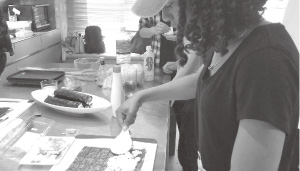
Students try making hand-rolled sushi
I came to Japan in April 2018 in order to do my engineering thesis at the Chuo University Korakuen campus.
Shiroikaze circle club was an important role for me during my stay in Japan. Thank to this circle I met a lot of great people and had opportunities to visit and travel in Japan. Shiroikaze does something really great, such as creating a relationship between exchange students and Japanese students.
Japanese students can easily practice their English while exchange students can learn more about the Japanese people and culture.
Even though English isn't my mother tongue, I was able to communicate easily with people from all around the world and share my culture with Japanese students by doing a small English presentation about my country which is Switzerland. Thanks to my Swiss friend who came to visit me here, my Japanese friends were able to try different Swiss dishes such as cheese, sausage and Swiss fondue.
I recommend everybody to go through Shiroikaze circle club. You will never regret it.
Other activities held by Shiroikaze
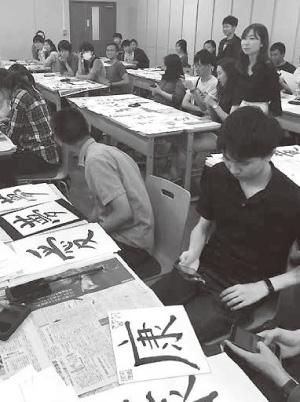
At the start of a calligraphy class
Community-based activities
Japanese and international students participate together in festivals held by the Tomisaka 2-chome neighborhood of Bunkyo City and other surrounding community associations located close to the Korakuen Campus. Through conversations different from those held on campus and through interaction with local residents, Chuo students learn about the culture and history of the community.
Consultation on studying abroad
Shiroikaze holds activities such as information events and consultations on studying abroad. These events feature stories of personal experiences given by Japanese students who studied overseas through the Tobitate! (Leap for Tomorrow) Study Abroad Initiative led by the MEXT. Shiroikaze also cooperates with the International Center in the Faculty of Science and Engineering to hold these events.
The opportunity to listen to the experiences of students who have actually studied abroad is a major impetus towards developing interest in overseas study. Since science and engineering students generally have less experience studying overseas than other students, it was especially necessary to plan such an event as an opportunity for forming a concrete image of what it is like to study abroad. This is why Shiroikaze holds events to learn about overseas study.
Many students from different grades attended the event. There was a lively interaction, with attendees staying after the event in order to ask more questions to students who had experienced studying abroad.
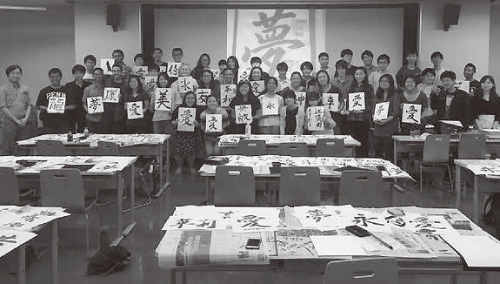
Look at our beautiful calligraphy!
Contact info
Twitter: @chuo_shiroikaze
E-mail: chuo.shiroikaze@gmail.com
Facebook: Chuo University Science and Engineering International Exchange Club (Shiroikaze)
